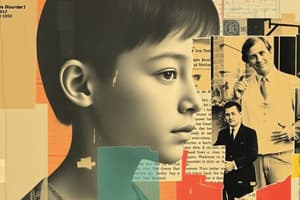Podcast
Questions and Answers
What must be present in the early developmental period for symptoms to be diagnosed?
What must be present in the early developmental period for symptoms to be diagnosed?
- Symptoms of aggression
- Symptoms of language delay
- Symptoms of social anxiety
- Symptoms of autism-related behaviors (correct)
Which of the following is NOT a deficit in social-emotional reciprocity associated with autism spectrum disorder?
Which of the following is NOT a deficit in social-emotional reciprocity associated with autism spectrum disorder?
- Reduced sharing of interests
- Abnormal social approach
- Engaging in extensive social conversations (correct)
- Failure to initiate social interactions
What category of behaviors must be present to meet the criteria for restricted, repetitive patterns?
What category of behaviors must be present to meet the criteria for restricted, repetitive patterns?
- Unusual emotional expressions
- Stereotyped or repetitive motor movements (correct)
- Poor academic performance
- Difficulty in physical activities
Which of the following is an example of hyper-reactivity to sensory input?
Which of the following is an example of hyper-reactivity to sensory input?
How is the severity of autism spectrum disorder determined?
How is the severity of autism spectrum disorder determined?
What behavior is indicative of 'insistence on sameness' in autism spectrum disorder?
What behavior is indicative of 'insistence on sameness' in autism spectrum disorder?
Which of the following describes a behavior that is characteristic of deficits in developing and maintaining relationships?
Which of the following describes a behavior that is characteristic of deficits in developing and maintaining relationships?
Which of the following is a common manifestation of restricted, fixated interests in individuals with autism spectrum disorder?
Which of the following is a common manifestation of restricted, fixated interests in individuals with autism spectrum disorder?
What is an example of a deficit in social-emotional reciprocity?
What is an example of a deficit in social-emotional reciprocity?
Which of the following behaviors indicates a deficit in nonverbal communicative behaviors?
Which of the following behaviors indicates a deficit in nonverbal communicative behaviors?
How might someone with deficits in understanding relationships behave?
How might someone with deficits in understanding relationships behave?
What is an example of a restricted, repetitive pattern of behavior?
What is an example of a restricted, repetitive pattern of behavior?
What indicates a highly restricted, fixated interest?
What indicates a highly restricted, fixated interest?
An individual displaying echolalia is exhibiting which type of behavior?
An individual displaying echolalia is exhibiting which type of behavior?
What behavior might reflect hyperreactivity to sensory input?
What behavior might reflect hyperreactivity to sensory input?
Which of the following is NOT a characteristic of deficits in social communication?
Which of the following is NOT a characteristic of deficits in social communication?
Study Notes
Autism Spectrum Disorder - Diagnostic Criteria
- Persistent deficits in social communication and social interaction across multiple contexts:
- Deficits in social-emotional reciprocity - abnormal social approach, failure of normal conversation, reduced sharing of interests, emotions, or affect, failure to initiate or respond to social interactions.
- Deficits in nonverbal communication behaviors used for social interaction - poorly integrated verbal and nonverbal communication, abnormalities in eye contact and body language, deficits in understanding and use of gestures, lack of facial expressions and nonverbal communication.
- Deficits in developing, maintaining, and understanding relationships - difficulties adjusting behavior to suit various social contexts, difficulties sharing imaginative play or making friends, absence of interest in peers.
- Restricted, repetitive patterns of behavior, interests, or activities:
- Stereotyped or repetitive motor movements, use of objects, or speech - simple motor stereotypies, lining up toys or flipping objects, echolalia, idiosyncratic phrases.
- Insistence on sameness, inflexible adherence to routines, or ritualized patterns of verbal or nonverbal behavior - extreme distress at small changes, difficulties with transitions, rigid thinking patterns, greeting rituals, need to take the same route or eat the same food every day.
- Highly restricted, fixated interests that are abnormal in intensity or focus - strong attachment to or preoccupation with unusual objects, excessively circumscribed or perseverative interests.
- Hyper- or hyporeactivity to sensory input or unusual interest in sensory aspects of the environment - apparent indifference to pain/temperature, adverse response to specific sounds or textures, excessive smelling or touching of objects, visual fascination with lights or movement.
- Symptoms must be present in the early developmental period - may not become fully manifest until social demands exceed limited capacities, or may be masked by learned strategies in later life.
- Symptoms cause clinically significant impairment in social, occupational, or other important areas of current functioning.
Studying That Suits You
Use AI to generate personalized quizzes and flashcards to suit your learning preferences.
Description
Test your understanding of the diagnostic criteria for Autism Spectrum Disorder. This quiz covers the persistent deficits in social communication and the restricted, repetitive behaviors associated with the condition. It is designed for those studying psychology or special education.




